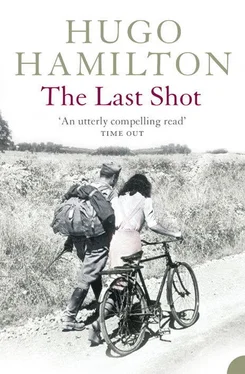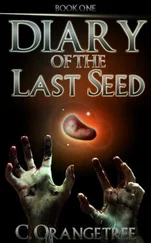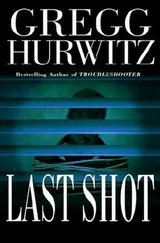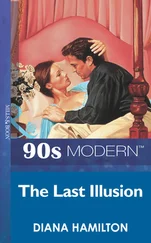‘Let’s see. Munster: it’s got a market place. It’s got jewellers, cafés, canals, cathedrals…and bells, endless bells on a Sunday. It’s the rainiest city in Germany. It’s flat, it’s green, it’s got no industry and never had. It’s a sanctuary for kite flyers, wanderers, cyclists, and, and, and…’
Anke often broke off with the words and, and, and…It reminded me of the time we first met in Düsseldorf.
‘Is that all?’
‘Well…’ She thought, puffing. ‘Münster now has a large concentration of Tommies – British soldiers.’
After another pause she added: ‘Münster also has the distinction of being the first civilian target to have been bombed from the air during the war.’
We went for coffee. Anke had strawberry cake. While we were sitting down, she told me how she felt about Alex and his illness. She could not bring herself to say the word leukaemia. Otherwise, she claimed to have come to terms with the inevitable. A few minutes later, quite unprovoked it seemed to me, she started crying. Tears streamed down her face quite openly while she spoke about her life in general. What I found strange was that she didn’t seem unhappy. If anything, she wanted to cry.
‘I can’t let myself cry in the house,’ she said.
She talked about Alexander with a false optimism, as though optimism would preserve him from fate. She refused to believe in fate.
‘What kills me is all these people who tell me it’s God’s plan,’ she said angrily. ‘I get the nuns here telling me I am blessed with the presence of a son like that. All that sanctimonious shit makes me angry…All this equality, some day, in heaven.’
Then Anke changed the subject. She was possessed of great diversity, and began to plan out a route for us to cycle. Before we left the café, Anke stole the silver jug from the table, placed it in her pocket and went up to pay the bill.
‘Jürgen never lets me steal things like that. He says we can buy all the jugs we want. It’s not the same.’
Minutes ago, she was crying. Now she laughed as we cycled away through the medieval streets and out of the town along the red paths; tyres grinding on the sand underneath. We came to a stable in the country, far away from any houses. When Anke saw the owner of the stable, a large woman with a red face, dressed in jodhpurs and riding hat, they greeted each other and Anke stopped. I was introduced to Frau Bohle. We were taken on a tour of the stables. Anke explained that people owned the horses individually and rented the space at the stables.
The woman showed us her favourite horse. Winnitou. I picked an apple from a wheelbarrow full of apples and gave it to a horse called Navajo. The horse gripped the apple with his lips. I watched him catch the fruit with his brown teeth and juggle it around in his mouth as he chewed. To a horse, an apple must be like a piece of chocolate is to us. He crunched for ages. Other horses looked out over the gates. There is something intimate in the way a horse looks at you.
We cycled on. Anke went ahead and I kept looking at the way her feet turned in the pedals. Sometimes she slowed down to remark on something; a feature in the landscape. Then she would race ahead again.
Once a squadron of RAF jets flew overhead reducing the land to white silence. When the soft, grinding sound of the bicycle tyres returned, Anke looked around and said, ‘So peaceful out here…’
Anke stopped. We left the bikes at the edge of the forest and walked for a while up-hill through the trees. When we seemed close to the top, Anke took my hand and led me out into a clearing where we could suddenly see right across the landscape. The town of Munster was like a toy town on the horizon, covered in a blue-grey cloud, under the streaming rain. We stood together for a while saying nothing.
These were the limits of freedom.
We cycled right into those blue clouds on the way back. It was as though we were travelling to meet them, cycling right into the rain. We got soaked. Anke’s hair was plastered down on her skull. Whenever she blinked, dozens of tiny drops jumped from her eyelashes.
The change came at last in the Eastern Bloc. The Soviet Union was beginning to collapse. The excitement in Germany about the freedom trains and the influx of East Germans had reached fever-pitch. It was on everybody’s mind. On everybody’s lips. Quite suddenly, before anyone had time to start fighting for it, the Berlin Wall came down and nobody could believe it. The day of 9 November 1989 was as strange as the day the Wall was built.
This time people around the world were able to see history on television. Crowds flocked to Berlin to chisel away a piece of the Wall for themselves. I watched it on TV myself. I saw the ecstatic faces of women, and men, jumping, embracing each other in the streets, in tears. The ecstasy of history.
Then came Czechoslovakia. I had been there only a month before, and nobody believed it would ever happen. Suddenly the silent power of the majority took over. The small crowds I had seen standing around with candles along the Karls Bridge swelled into thousands on Wenceslas Square. I imagined the deafening sound of all those footsteps in the streets. I heard the sound of keys ringing, the symbol of freedom. Days later, the velvet revolution had liberated Czechoslovakia from communist tyranny. They had discovered the power of harmless masses; and the power of silent feet, and candles.
This time, everybody in Prague was expecting the tanks again. The whole world was waiting for the shooting to start. But weapons had become less than useless against candles. You can’t argue with candles.
The streets of Prague were celebrating. People leaping on the bonnets and roofs of cars. Students drinking in the streets. The pubs and cafés were crammed with talkers. Everywhere people were ready to explain, as though they had never done so before, among themselves and to the press reporters around the world. The miracle had to be re-enacted and repeated again and again in words and in smiles to camera. I thought of going back to Prague. Trust me to have visited Prague a month before the greatest revolution in history.
I watched it all on the TV. I saw that the temperature had dropped to freezing point in Prague. You could see people’s breath as they talked.
I sent a note to Dr Milan Houdek to congratulate him and his country on their liberation.
Two weeks later, I received a letter from him thanking me. He had checked some of the facts about Louny at the end of the war in 1945. He confirmed them against other sources. He went on to describe the celebrations and the euphoria of the town when the communist government fell. He said he saw people go into the pub U Somolu who had never been inside a bar before. He saw people talking who had never opened their mouths in their lives before. He saw people who wouldn’t greet each other in the street dancing together on the square in sub-zero temperatures. At the end of the letter, he wrote this:
You remember I told you in the church that I don’t like communists. I could not imagine such great and splendid changes would happen so early. But it could not have been possible without changes in the USSR. Now the communists do not want to leave their castle at Louny, saying it was built for their members. You know the tall red building at the end of the town where I came to meet you? They are holding on to it. We plan to make a people chain around the building. We hope the TV stations will come…
I sent a note thanking him for his research. I enclosed some cuttings from British newspapers so that he could compare the reportage. I wanted him to see how interested the outside world was.
Some weeks later, I received another short letter back:
Читать дальше
Конец ознакомительного отрывка
Купить книгу












